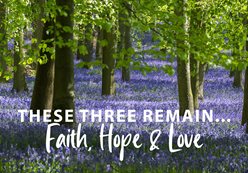After lockdown my wife Ruth and I met friends in Downhill Wood near Castlerock. It was a lovely walk and the spell of dry weather enabled us to walk away from the usual paths. I came down a hill covered in bluebells and into the powerful scent of all the flowers. I knew I would not have experienced this beauty and smell if we had not gone off the beaten track. It struck me that this was an illustration of the lessons the Lord was teaching us as his church. It has taken our faith down an unexpected path and caused us to experience the beauty of God in a new way. What I have been learning about is summed up in the word ‘lament’.

Learning to lament
N.T. Wright in his book God and the Pandemic starts chapter 5 with these words:
“I have urged that we should embrace lament as the vital initial Christian response to this pandemic... Grief, after all, is part of love. Not to grieve, not to lament, is to slam the door on the same place in the innermost heart from which love itself comes.”
In the Psalms, laments were the songs sung when life had become chaotic, with their agonising cries,
“Where, O Lord? How long, O Lord? Why, O Lord?” A common expression in these psalms of lament was groaning. For example Psalm 22.1
‘My God, my God, why have you forsaken me? Why are you so far from saving me, so far from the words of my groaning?’
Another Christian author writes how the Holy Spirit’s ‘groaning’ in Romans 8 is the same Greek work for groaning in the lament psalms in the Greek version of the Old Testament. Why does Paul choose the same word? Is he linking the Holy Spirit’s work in our lives with the groaning in the Psalms. As Paul says in Roman 8:22-23 and 26:
‘We know that the whole creation has been groaning as in the pains of childbirth right up to the present time. Not only so, but we ourselves, who have the firstfruits of the Spirit, groan inwardly as we wait eagerly for our adoption as sons, the redemption of our bodies… In the same way, the Spirit helps us in our weakness. We do not know what we ought to pray for, but the Spirit himself intercedes for us with groans that words cannot express.’
Creation groans, we groan, the Spirit groans, as we live in the hope of the glory that will be revealed (Romans 8:18ff). Even the psalms of lament have the ‘plea section’ but they end with ‘praise section’ as the psalmist looks forward in hope to God’s salvation.
So how does this lesson connect with being global disciples?
About two weeks ago we got a text from a local friend who used to support a student in Malawi but stopped some time ago. She wrote,
“I have been thinking about [name] recently… I think this Covid-19 pandemic has really reordered my priorities, especially with money so I want to help if I can.”
I see this offer to help as an aspect of the Holy Spirit’s work in her life.
I was also in correspondence with a friend who is a Malawian minister and he updated me with these words:
“It is now that most people realise that Covid-19 is real. But it is too late. We pray that the cases may not increase for a long time… People are fearful. Everybody talks about the virus. Many families have been affected directly or indirectly. Businesses are at standstill. Church offerings and pledges have gone down. Even the number of church attendance is very low. Everyone suspects a friend to have the virus, and you can even suspect yourself because you don’t know the person you have met before…. [But] God is Supreme. He is above all things on earth…. I preached on Psalm 23.1-6 and Romans 8:31ff. God Almighty is our shepherd and he loves and cares for us even in time of Covid-19.”
Many of us have friends who live in different parts of the world and in very different situations. The question lament has been asking of me is, “do I lament enough? Do I really feel the pain of others? Am I praying for them out of a lamenting-love for what others face? As Wright said above, ‘Not to grieve, not to lament, is to slam the door on the same place in the innermost heart from which love itself comes.’ It is also clear from Romans 8 that my capacity to lament with others is the overflow of my walk in the Lord by his Spirit. However, it has also been clear to us as a congregation, preaching through the Sermon on the Mount these last months, that we are called to reflect the character of God. This must result in action.
Remember the poor
John Piper closed his book Coronavirus and Christ with a prayer that included these words:
‘Remember the poor, O Lord, according to your mercy.
Do not forget the cry of the afflicted.
Grant recovery. Grant a cure.
Deliver us—your poor, helpless creatures—from these sorrows, we pray.
But do not waste our misery and grief, O Lord…
Grant us capacities of outrage at our own belittling of your glory.
Open the eyes of our hearts to see and savour the beauty of Christ.
Incline our hearts to your word, your Son, and your way.
Fill us with compassionate courage.
And make a name for yourself in the way your people serve…’
This is what I have been learning about being a global disciple.
Stephen McCracken is the minister of First Ballymoney Presbyterian Church.
This blog is part of a wider series under the campaign, These Three Remain to help members and congregations during the Coronavirus pandemic.
Visit the These Three Remain hub here.